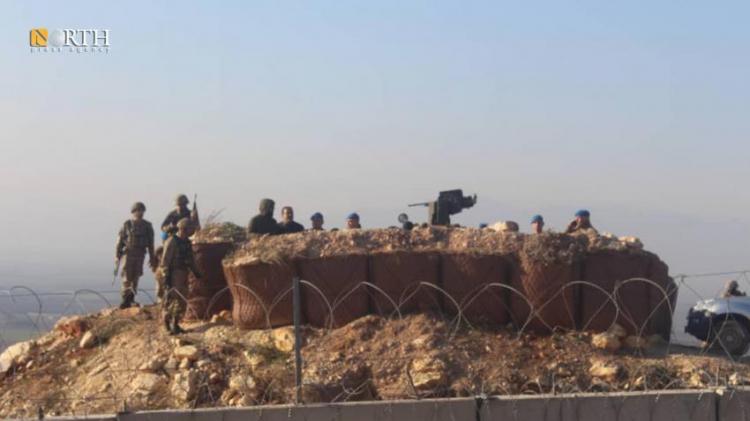Idlib – Hadia Mansour – North-Press Agency
Talking about the fate of the region has become more urgent in the shadow of the government forces’ expansion at the expense of the shrinking territory controlled by the armed opposition in Idlib in the country’s northwest, especially after government forces took control of most of the region’s south recently.
Talk about the area’s future is ongoing with the latest developments regarding the Turkish position in Idlib and the importance of the Turkish observation points distributed throughout the area as Ankara builds up its forces every day.
In September 2018, on the background of the Sochi agreement signed by Russian president Vladimir Putin and his Turkish counterpart Recep Tayyip Erdogan, Turkey constructed twelve observation points distributed within the regions under the control of the armed opposition groups. Most of this region was recently captured by government forces.
Muhammad Salameh, the official spokesman of the political body in Idlib which defines itself as “independent”, believes that the 12 observation points are different from those Turkey established recently.
He said "points established under the Sochi Agreement are limited to observing the ceasefire, identifying the violations of the agreement, and continuously reporting to their political and military leaders about the violations from whichever party.”
According to Salameh, those points are not authorized to respond to violations by the regime. The political administration did not know about this until after several visits to the points.
Concerning the intensive Turkish convoys which recently entered Syria, Salameh said those convoys are “military barracks sent to different areas of Idlib, for combat missions, not observation like the previous points whose mission ended after most of them no longer had any goal or importance.”
“The Turkish presence in the area is as that of other countries active in Syria, as it serves only its interests, even if those interests have been in conflict with the interests of the Syrian people,” Salameh noted.
The Turkish army has intensified its efforts to expand its military presence under Russian air cover. It established 56 points in four governorates in the Aleppo countryside, Latakia, Hama, and Idlib, while Russian and Turkish forces conducted a new joint patrol in North and East Syria which began from Ashema in the Kobani countryside and travelled through western Kobani. Russian and Turkish forces also conducted a new joint patrol in the Dirbesiye countryside starting from the Sherik border crossing with Turkey, passing through a number of village, making it the 39th and latest patrol since the signing of the Sochi agreement between Putin and Erdogan on October 22nd, 2019.
Ali Sultan, the head of Syria Gathered Revolution, told North-Press that one of the reasons for Turkish involvement in Syria is Syria’s geographical location and length of its border with Turkey, in addition to the Kurdish Question, which pushed Turkey to stand firm regarding Syria with the help of “revolutionary” forces, allied with them to the extent of dependency.
Sultan added that Turkish interests are linked to "creating a safe zone in northern Syria to secure a future role in the final settlement of the Syrian situation.” The Turkish military buildups are only to grant itself a position as an important player in drawing the features of the future Syrian government.
Sultan goes on to say that the presence of the Turkish points in Idlib is still "disappointing to Syrians.” When Turkish forces entered, they noticed that government forces could not overtake these points, but this conviction soon vanished and became a source of anger and discontent in popular circles. Most people were surprised that it did not live up to expectations. The inability for the government militias to occupy their land was dependent on the Turkish position, and they expected it would be firm with respect to violations.
“Until now, we are living in a state of shock, with a little hope to get back what has been occupied with the support of the Turks. We live in a state of anxiety and anticipation in which in our dreams of returning to the original borders is impossible, and the trust built on the Turks to face the regime has been undone,” he says.
Secretary-General of Syrian Justice Rally Muhammad Nour Hamidi sees the nature of the agreement between Turkey and Russia as only a temporary agreement organized by Sochi and Astana.
Hamidi expects government forces to retreat due to the fact that “there are no other options”. His expectations come from Turkey's massive build-ups as well as the Turks, Russians, and even Americans commitment to implementing the agreements.
On the other hand, Fuad al-Shami, a political analyst living in Idlib, suggested that the secret behind the intensive Turkish military existence in Idlib is to work on “making the military factions controlling Idlib adhere to Turkey's policy and fall under its flag.”
He says that “Ankara, which has been lenient with those refusing to allow Russian patrols, has renewed its adherence to the agreement with Russia to eliminate what it has described as terrorist groups. However, the plan to turn the armed groups into a regular army includes some groups such as Hayat Tahrir al-Sham, and this is what Turkey aspires to.”
At the time in which the area is witnessing increasing military build-up and joint patrols in implementation of vague Russian-Turkish agreements in Syria’s Idlib, civilians' hopes for an international solution which fulfills their aspiration of returning home and ends the tragedies which have exhausted them throughout years of the bloody war.”

